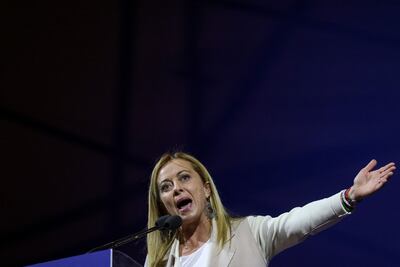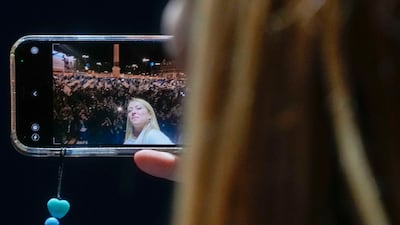Italy is poised to elect its first far-right leader since the Second World War in a general election on Sunday, an outcome that could shake up the European Union and pile pressure on its leaders to get tougher on migration.
Giorgia Meloni and her Brothers of Italy party are the overwhelming favourites to win the election and form a right-wing coalition with Silvio Berlusconi’s Forza Italia party and Matteo Salvini’s anti-immigrant League.
Ms Meloni, 45, would be Italy’s first female prime minister and has positioned herself as a fresh face after keeping her party out of Mario Draghi’s unity government, the latest in a long line of fragile Italian coalitions.
Although her platform includes the familiar populist themes of immigration, patriotism and traditional family values, Ms Meloni’s pro-Ukraine stance in the war with Russia sets her apart from some of her fellow nationalists in Europe.
But despite her efforts to distance herself from the party’s neo-fascist heritage, there is much concern in Europe that Ms Meloni will damage Italy’s standing and give nationalist leaders such as Hungary’s Viktor Orban a weighty ally in the EU.
One of her most eye-catching ideas is a “naval blockade” to stop the flow of migrants across the Mediterranean, a sensitive issue on which the right-wing alliance is promising a hard-line approach.
Once in power, the parties are expected to lobby Italy’s EU neighbours to take in more of the Mediterranean migrants and tell Brussels to set up reception centres outside Europe’s borders to head off asylum claims at the pass.

“Immigration has to be managed, to protect those who play host to immigrants and those who really need us to welcome them,” Ms Meloni said during one of her last campaign stops in Rome.
For Ivan Fadini, a co-founder of the International Napoli Network, which recruits volunteers for migration charities in Naples, Italy’s populist leaders are inventing the threat posed by migrants and refugees in the country.
“There is no invasion of migrants,” said Mr Fadini. People from North Africa were the victims of poor working conditions, low pay and excessive bureaucracy that made it harder for them to integrate in Italy, he said.
“When they talk about a security alert for terrorism because radical Muslims could come who do terrorist attacks to our cities — let me stress that Italy never had a serious terrorist attack from Muslims,” he said.
“There is fake news about the numbers. And there is fake news also about the budget that Italy has to have to assist asylum seekers or refugees.”

Meloni's rise
The Brothers of Italy, who take their name from the opening words of the national anthem, are the latest party to shake up Italy’s complex political landscape after rising from 4.4 per cent of the vote at the last election to lead the polls this time around.
While Brothers of Italy posters are plastered with her smiling face, Ms Meloni is known for her bellowing speeches, most notably a viral 2019 monologue in which she cried: “I am Giorgia, I am a woman, I am a mother, I am an Italian, I am a Christian.”
Ms Meloni’s party “has ambivalent stances when it comes to symbolic references to the fascist legacy in Italy, and it embraces a world vision that is grounded in nativism and authoritarianism and populism”, said political scientist Caterina Froio.
The two potential coalition partners, Mr Berlusconi and Mr Salvini, are experienced operators with big egos but both have said they would support Ms Meloni despite suggestions they might struggle to maintain a united front.
Both men helped to bring down Mr Draghi’s government in July, after an 18-month spell in office in which he was praised for a steady hand that helped Italy get its hands on about €200 billion ($197bn) of Covid-19 recovery funding from the EU.
But Ms Meloni has tapped into a desire for change after a succession of makeshift governments with questionable democratic mandates, including Mr Draghi’s, steered Italy through a decade of crises.
“While Mario Draghi managed to bring together most other political parties, she [Ms Meloni] resolutely stuck to the opposition,” said Ms Froio at an event hosted by the Swedish Institute for European Policy Studies.
A shift to the right is likely after the main centre-left party, the Democratic Party (PD), failed to agree a common platform with either the radical left or the amorphous Five Star Movement — virtually ensuring its defeat in a system that favours coalitions.

Enrico Letta, the bespectacled PD leader, himself a former prime minister, bemoaned Ms Meloni’s outreach to the Orban government in Hungary, the mischief maker-in-chief in EU discussions over Ukraine and a regime accused of eroding democratic freedom.
“Italy’s vote will influence the future of the whole of Europe,” Mr Letta said on a visit to Berlin to speak to Germany’s Social Democrats, a sister party of the PD.
Ms Meloni has tried to shed any sense of isolationism by saying she wants Italy to be more of a “protagonist” in world affairs. Mr Salvini, in turn, is a sceptic of sanctions on Russia and Mr Berlusconi was once a close friend of Vladimir Putin.
The euro slid to a 20-year low on Friday as the Italian election added to market concerns. Investors “will be looking nervously to the new government” for signs that fiscal restraint will be abandoned, said analysts at investment bank ING.
A renewed tug-of-war with Brussels over migration would add to the EU’s headaches after years of stalemate on the issue, while an agreement with Libyan coastguards to control migration has been marred by reports of human rights abuse.
In the meantime, the real problems faced by migrants on the ground may go ignored, fears Mr Fadini, who said that even good work by NGOs in Naples, helping people to receive shelter, food and Italian lessons, can only take place within the parameters set in Rome.
While children born in Italy struggle to obtain citizenship because their parents were irregular migrants, as Mr Fadini described it, Ms Meloni preferred to stir up outrage by publishing footage of the alleged rape of a woman by a Guinean asylum seeker.
“She could be the first woman to be come prime minister in Italy and I don’t know why she doesn’t have more empathy for other women,” Mr Fadini said.










